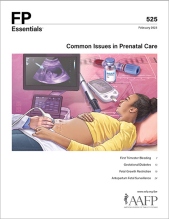
This clinical content conforms to AAFP criteria for CME.
Two screening approaches are used to detect gestational diabetes, the 1-step and 2-step methods. The 1-step method is diagnostic and consists of a 75-g, 2-hour oral glucose tolerance test (OGTT). The 2-step method consists of a 50-g, 1-hour glucose challenge test, followed by a 100-g, 3-hr OGTT if initial test results are positive. All pregnant patients should be screened for gestational diabetes between 24 and 28 weeks’ gestation unless pregestational diabetes is present. Lifestyle modifications are fundamental to management, and most patients are able to control blood glucose levels with these alone. Persistent hyperglycemia should be managed with drugs. Currently, insulin is the only drug approved by the Food and Drug Administration (FDA) for gestational diabetes management. Metformin or glyburide can be reasonable alternatives. For patients who require drugs, antepartum fetal surveillance is recommended starting at 32 weeks’ gestation. The American College of Obstetricians and Gynecologists (ACOG) recommends delivery at 39 0/7 to 40 6/7 weeks’ gestation for patients with gestational diabetes controlled with diet alone. Earlier delivery is recommended for patients with gestational diabetes controlled with drugs, at 39 0/7 to 39 6/7 weeks’ gestation. Patients with gestational diabetes are at increased risk of type 2 diabetes later in life. These patients should be screened for prediabetes and diabetes between 4 and 12 weeks postpartum with a 75-g, 2-hour OGTT. Postpartum patients with a normal OGTT result should be screened every 1 to 3 years thereafter.
Subscribe
From $350- Immediate, unlimited access to FP Essentials content
- 60 CME credits/year
- AAFP app access
- Print delivery available
Edition Access
$44- Immediate, unlimited access to this edition's content
- 5 CME credits
- AAFP app access
- Print delivery available
